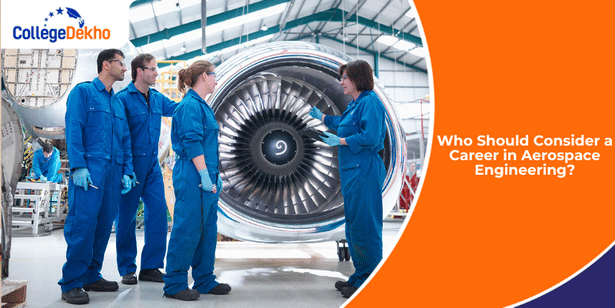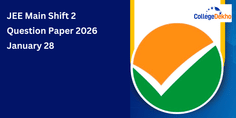
Who should consider a career in Aerospace Engineering? The answer to this question has many facets, and there is no single type or group of people who should consider Aerospace Engineering as a profession. Aerospace Engineering deals with the design, production, testing, and development of aircraft, missiles, spacecraft, and related systems. Aerospace Engineering combines mechanical, electrical, and computer engineering, making it a viable career choice for many individuals. However, due to the requirements that must be met for an individual to become an Aerospace Engineer, this vocation is not everyone’s cup of tea.
Also Read: Aeronautical Engineering vs Aerospace Engineering
Aerospace Engineering Eligibility Requirements
In order to understand who should consider a career in aerospace engineering, you must know the eligibility requirements for an aerospace engineer.
Qualification Level | Eligibility Criteria | Minimum Marks Required | Entrance Exams | Additional Requirements |
|---|---|---|---|---|
Undergraduate (BE/ B.Tech in Aerospace Engineering ) | Must have completed 10+2 (Science stream) with Physics, Chemistry, and Mathematics (PCM) as core subjects | Minimum 60% aggregate (varies by institute; 75% for IITs) | JEE Main , JEE Advanced, State-level exams (eg, MHT-CET, WBJEE ) | Candidates must be at least 17 years old at admission year |
Diploma in Aerospace Engineering | Passed Class 10 with Science and Mathematics | Minimum 50% aggregate | Polytechnic entrance exams (state-level) | Lateral entry is possible in the 2nd year of B.Tech in some institutes |
Postgraduate (ME/ M.Tech in Aerospace Engineering) | Must hold a BE/ B.Tech in Aerospace/ Mechanical/ Avionics or related field | Minimum 60% aggregate or CGPA ≥ 6.0 | GATE , PGCET, or university-level exams | Some institutes conduct personal interviews or written tests |
Doctoral (Ph.D. in Aerospace Engineering) | Must have an M.Tech/ ME in Aerospace or allied discipline | Minimum 60% or equivalent CGPA | GATE, CSIR-NET , UGC-NET, or institute-level test | Research proposal and interview required |
Skills Required for Aerospace Engineering
Numerous skills are required to excel in aerospace engineering, and these include social, technical, and logistical skills. Check the list of skills crucial for aerospace engineering below:
Skill Category | Specific Skills | Importance / Application |
|---|---|---|
Attention to Detail | Precision, Accuracy, Error Detection | Vital for ensuring safety and efficiency in aerospace designs |
Communication Skills | Technical writing, Presentation, Team collaboration | Needed to work with multidisciplinary teams and document findings effectively |
Design & Software Skills | CAD Tools (CATIA, SolidWorks, AutoCAD), MATLAB, ANSYS | Crucial for 3D modeling, stress analysis, and computational simulations |
Mathematical & Analytical Skills | Advanced Mathematics, Calculus, Statistics, Computational Analysis | Used for modeling, simulation, and solving engineering problems |
Physical & Mental Endurance | Focus, Patience, Stress management | Required for long testing phases and demanding research environments |
Problem-Solving Ability | Logical thinking, Troubleshooting, Innovative approach | Helps in identifying and resolving technical design or performance issues |
Programming Skills | C, C++, Python, MATLAB | Required for simulation automation, data analysis, and control systems |
Project Management | Time management, Budget planning, Resource allocation | Important for handling complex aerospace projects efficiently |
Research & Innovation | Curiosity, Experimentation, Critical evaluation | Important for developing new technologies and improving existing systems |
Technical Skills | Aerodynamics, Fluid Mechanics, Propulsion, Thermodynamics | Essential for aircraft and spacecraft design, performance analysis, and testing |
We hope we were able to answer who should consider a career in Aerospace Engineering. Check the links below to learn more!
Related Articles:
For any admission-related guidance, call our toll-free number 1800-572-9877, or fill out our Common Application Form (CAF) . Stay tuned with CollegeDekho for more updates related to UG/PG admission and colleges!
FAQs
Yes, you can work for ISRO as an Aerospace Engineer by qualifying through ISRO’s Centralised Recruitment (ICRB) or GATE. Roles include spacecraft design, propulsion, testing, and mission planning, requiring strong technical, analytical, and research skills in aerospace systems.
In India, the average salary for an Aerospace Engineer ranges from INR 6–12 LPA for entry to mid-level positions, while experienced professionals in top organizations can earn INR 15–25 LPA or more annually.
Aerospace Engineers are hired by aircraft and spacecraft manufacturers, defense organizations, research agencies, airlines, government space departments, and software firms specializing in simulation or control systems—such as ISRO, DRDO, HAL, Boeing, Airbus, Rolls-Royce, and NASA contractors.
Aerospace Engineers design, develop, and test aircraft, spacecraft, satellites, and missiles. They analyze aerodynamic performance, ensure safety standards, manage manufacturing processes, troubleshoot system issues, and collaborate with multidisciplinary teams to innovate and improve aerospace technologies for optimal efficiency and reliability.
Yes, you can pursue Aerospace Engineering with a Computer Science background, especially at the postgraduate level. Your programming and computational skills are valuable for aerospace software, simulations, robotics, and data analysis applications.

















Similar Articles
JEE Main Shift 2 Question Paper 2026 January 28
List of Colleges Accepting 75,000 to 1,00,000 Rank in JEE Main 2026
List of Colleges Accepting 10,000 to 25,000 Rank in JEE Main 2026
List of Colleges Accepting 50,000 to 75,000 Rank in JEE Main 2026
Predicted Percentile for 144 Marks in JEE Main 2026
Minimum Marks in JEE Main 2026 to Qualify for JEE Advanced